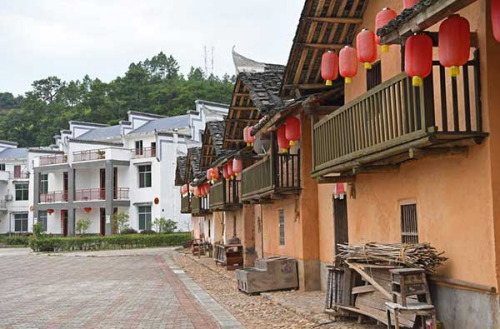
Red tourism sites have attracted more visitors in recent years and are receiving huge investment from the country. (Photo/Xinhua)
Mao Haofu, 28, has returned from studying in Britain to his hometown in Ciping in East China's Jinggangshan city, which was the first rural revolutionary base established in 1927 by the Communist Party of China (CPC).
He is now an on-site teacher at Jiangxi Executive Leadership Academy. Although most tourists are Chinese, he is prepared to tell the Party's story in English.
He has been influenced by his father and grandfather, both masters of Party history, as well as his colleagues who have devoted themselves to teaching despite poor living conditions.
"I felt a sense of achievement when I saw more foreign officials come to our academy. They were keen to know more about our country," he said.
Kuang Sheng, vice president of the China Executive Leadership Academy of Jinggangshan, said the world is eager to know more about the CPC and the Chinese path and experience, as China offers Chinese wisdom and a Chinese approach to solving problems.
To introduce the former residence of Comrade Mao Zedong, Mao Haofu studied materials in a local museum and the authoritative English versions of the works of Mao Zedong, rather than directly translating the tour guide introduction.
The Jinggangshan Mountains are known as the birthplace of the Chinese Red Army, and the cradle of the Chinese revolution.
Liu Hong, Party chief of Jinggangshan, said that the city is developing an open economy led by tourism. It has been visited by delegates from several foreign countries, including Cuba, Vietnam, Cambodia, Laos and African countries.
Liu said a leader of an African delegation told him that China's experience in helping people get rid of poverty were worth learning from.
Mao Haofu, 28, has returned from studying in Britain to his hometown in Ciping in East China's Jinggangshan city, which was the first rural revolutionary base established in 1927 by the Communist Party of China (CPC).
He is now an on-site teacher at Jiangxi Executive Leadership Academy. Although most tourists are Chinese, he is prepared to tell the Party's story in English.
He has been influenced by his father and grandfather, both masters of Party history, as well as his colleagues who have devoted themselves to teaching despite poor living conditions.
"I felt a sense of achievement when I saw more foreign officials come to our academy. They were keen to know more about our country," he said.
Kuang Sheng, vice president of the China Executive Leadership Academy of Jinggangshan, said the world is eager to know more about the CPC and the Chinese path and experience, as China offers Chinese wisdom and a Chinese approach to solving problems.
To introduce the former residence of Comrade Mao Zedong, Mao Haofu studied materials in a local museum and the authoritative English versions of the works of Mao Zedong, rather than directly translating the tour guide introduction.
The Jinggangshan Mountains are known as the birthplace of the Chinese Red Army, and the cradle of the Chinese revolution.
Liu Hong, Party chief of Jinggangshan, said that the city is developing an open economy led by tourism. It has been visited by delegates from several foreign countries, including Cuba, Vietnam, Cambodia, Laos and African countries.
Liu said a leader of an African delegation told him that China's experience in helping people get rid of poverty were worth learning from.
Red tourism sites have attracted more visitors in recent years and are receiving huge investment from the country.
China's National Development and Reform Commission has encouraged more efforts to preserve revolutionary sites and released a list of red tourism sites in 2015.
In 2016, a total of 1.55 billion yuan (about $228.3 million) was spent to support "red tourism," according to the Ministry of Finance.
At another revolutionary site, Xibaipo, in Pingshan County of north China's Hebei Province, Duan Keqian, a tour guide of the Xibaipo Memorial Hall, was busy preparing an English version of her speech.
Xibaipo is an old revolutionary base where the leadership of the CPC was garrisoned from May 1948 till early 1949, drawing up the blueprint for a new country and preparing for the CPC's new role as the ruling party.
"We have been really busy in the last month, but are happy to introduce more information to our audience," said Duan, adding that she has witnessed a growing number of visiting foreign teachers, doctors and business people who work near Xibaipo.
"We have taken exams to qualify as guides. Each of us should focus on a certain field, and I focus on people's daily lives," Duan said. "People will be fired if they get poor regular assessments."
According to Duan, there are about 80 such guides at the memorial hall, as well as at the revolutionists' former residences, working in Chinese, English, Russian, Italian and Japanese languages.
Russian Andrey Lyakh, 45, visited Xibaipo after doing business in Shijiazhuang, capital of Hebei Province, about a two-hour drive away.
He listened carefully to his interpreter and nodded at times, walking in the yard of the former residences.
"I have heard of Lenin and Mao Zedong since I was a child, and I think they are all great men," said Lyakh. "The site impressed me very much."


















































